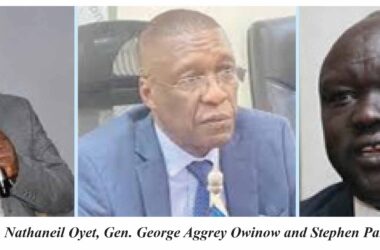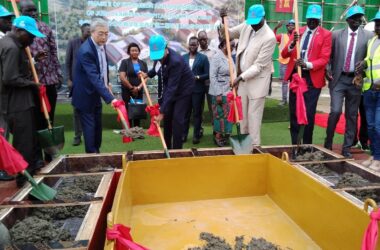By Bida Elly David
The peace talks between the Sudanese government and rivals is beginning to gain hope as the President of South Sudan makes a move to restore amity through critical mediation of talks.
This development transpired in a meeting between President Salva Kiir and a Member of the Sudan Transitional Sovereign Council, Lieutenant General Yasser Abdul Rahman Al-Atta and Chad special Envoy, El Sheikh Ebn El Omar, guarantor to the Sudanese Peace Agreement.
The major aim of the meeting was to discuss the current status of the implementation of the Juba Peace Agreement for Sudan and how it will be effectively implemented.
In a statement posted on the official Presidential Facebook page, President Salva Kiir demonstrated his commitment to ensure that the political and economic row between the Khartoum government and the warring parties end for the sake of amity.
Kiir further, vowed to end the continuous suffering that impact the citizens in Sudan saying that the two countries are close sisterly nations despite their different political affiliations.
He stated that peace through dialogue and unconditional decision to end violence is the only solution to boost national economic development and unity among citizens of one nation.
In his remarks, the Presidential Advisor on National Security Affairs, and chairman of South Sudan Mediation Committee, Tut Gatluak Manime, affirmed the commitment of South Sudan government towards aiding Sudan to gain security stability.
He said that the current evaluation workshop on the Juba Agreement for Peace in Sudan will bring result into consensus between the government and the parties involved.
Meanwhile, Gen. Jamal Abdel-Majeed a member of the council lauded the historic effort and the role played by the Republic of South Sudan in establishing security and stability in Sudan.
The Sudanese transitional government and their rivals have been in a political and economic row since Hassen Omar Al Bashir was over thrown from power in 2019.
Since the regime change, Sudan continued to face intersecting political and economic challenges coinciding with 2022 increased violence involving paramilitary forces in peripheral areas as well as ongoing anti-government demonstrations in Khartoum.
According to gathered tale since the coup in October 2021, the military and paramilitary elites have struggled to maintain order as Sudan’s economic free-fall and hunger crisis continue unabated
Demonstrations against military rule and the worsening economic outlook have compounded Sudan’s political and economic gridlock.
According to United Nations, Security forces, domestic and international initiatives tried to resolve the political turmoil but leftist factions – including Resistance Committees and the Sudanese Communist Party refused to participate insisting military step down from power.
The report viewed that demonstrations have escalated in the greater Khartoum area in 2022, where Resistance Committees made numerous attempts to organize marches to the Republican Palace.
“The rise in political violence across provincial areas is most apparent in Abyei and Darfur, and more recently in Blue Nile. In Abyei, political violence events more than tripled in the first half of 2022 compared to all of last year, driven by reciprocal attacks between Misseriya and Ngok Dinka militias, with Ngok Dinka civilians bearing the brunt of the violence,” the report states.
Last year fighting broke out between the Ngok Dinka and Twic Dinka from South Sudan over dormant territorial dispute. These events have contributed to a sevenfold increase in fatalities in Abyei in the first half of 2022 compared to the entirety of 2021.




